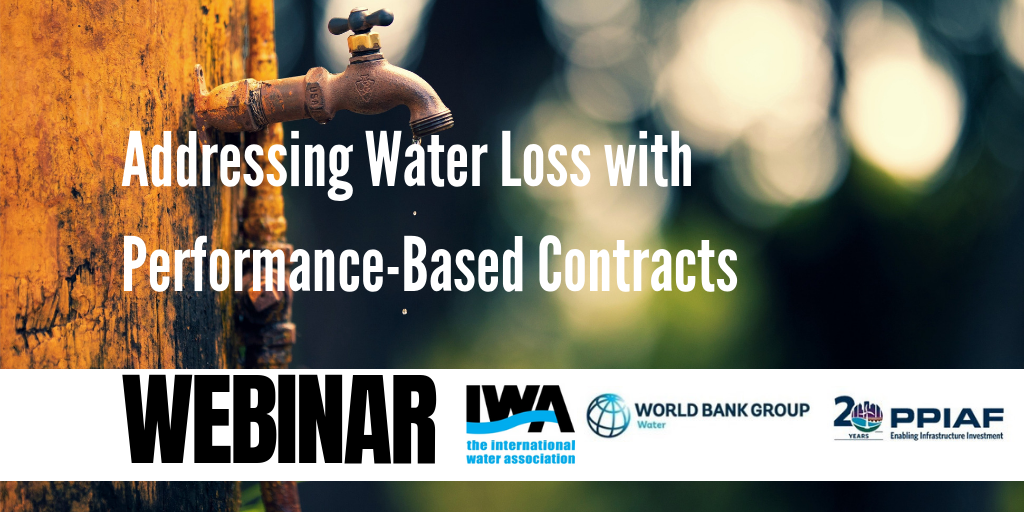Performance-Based Contracts for Improving Utilities Efficiency: A Conversation with the Authors
IWA launched its Task Group on Performance-Based Contracts (PBCs) in 2011 to support the growing awareness and implementation of PBCs in the water sector. A product of this collaboration between water sector experts was the publication of Performance-Based Contracts for Improving Utilities Efficiency: Experiences and Perspectives in August 2018. The book is a compendium of case studies and contributions written by members of the Task Group and experts from the IWA network. I interviewed the authors of the book, Didier Carron, Jan Janssens and Joe Dalton, to learn more about how this collective work gives visibility to innovative financial instruments that can support the growth of sustainable water utilities.
- What aspects of this book make it unique? Why does it matter to the water sector?
Water utilities are coming under increasing pressure from Governments, funding and regulatory agencies and the people they serve, to improve the effectiveness and value-for-money of the essential services that they provide. PBCs are a means to incentivize the achievement of this objective and have been increasingly utilized in recent years to address the issue of non-revenue water, though their use is still nascent in other areas of utility management. They offer an alternative path to this goal than large scale public-private partnerships (PPPs) or privatization. The book documents a number of interesting PBCs implemented by utilities around the world, documenting lessons learned and seeking to provide a framework for their future adaptation to meet global water utility challenges.
- What audience were you hoping to reach with this publication and what message were you trying to send them?
PBCs have to be appealing to three parties: the utility, the contractor and the financier. They have to simultaneously provide a good return on investment to the financier, reasonable profit for the contractor and improved efficiency and value for money for the utility. Without a strong value proposition for each party, a PBC is not feasible, regardless of the need. This book is aimed at individuals from these three parties who could potentially be involved in scoping, financing, managing or executing a PBC. Balancing the sometimes contradicting interests of these parties is the key to a good PBC design.
- What differentiates PBCs from traditional public-private partnerships?
A PBC is a formalized legal contract designed to achieve certain pre-determined performance targets. These contractual agreements can be established between internal and/or external parties, two public parties, or public-private parties. A key design requirement is the absolute clarity of roles, responsibilities and accountabilities.
A fundamental paradigm change is required in the water sector, one that promotes a bottom-up, demand-side, output-oriented approach, rather than a top-down, supply-side driven approach. Performance-based contracting can create a positive dynamic for reform, but should certainly NOT be considered as a substitute for carrying out the institutional reforms necessary to promote the sustainability of the sector.
As mentioned, a PBC consists of the establishment of a contractual relationship between two entities to empower and to create incentive and accountability structures, thereby improving service delivery and increasing the efficiency of operations. Properly designed, a PBC can achieve better results than traditional public sector, input-based, contracting methods. However, the effective use of any type of contractual arrangement assumes a set of pre-requisites, such as the existence of a legal and administrative framework for enforcement.
A major shift in PPP contracting in recent years has been the extensive use of Key Performance Indicators (KPIs) for tighter and more transparent control by public entities. A PBC is a contractual feature that can be applied to the whole range of PPPs, from service contracts and operator contracts, to lease/affermage and full concession contracts, and even to build-operate-transfer (BOT) contracts. Overall, PBCs are an effective option to take advantage of private expertise and capacity under the control of the public authority. They are focused, limited in time and financially logical.
- What is the one thing that you want readers to remember about the book?
As mentioned above, PBCs have been most commonly, and successfully, used for NRW reduction projects. However, PBCs can be tailored for almost any aspect of utility operations where efficiency improvements are desired. They provide an opportunity for utilities to leverage expertise, usually from the private sector but not exclusively, as illustrated by the example of internal performance contracts used by the National Water and Sewerage Corporation in Uganda. A key challenge is achieving a balance between the utility’s natural desire to retain control of their operations and delegating sufficient responsibility to a contractor so that they are empowered and incentivised to reach efficiency targets.
- How do you aim to build on this work or branch into new areas in 2019?
We hope this book will encourage water utilities to share their experiences with PBCs. Upcoming IWA conferences like the 1st Intermittent Water Supply Conference and Water Loss 2019 (Southeast Europe Regional Conference) provide platforms to share and learn more about these topics. Financial and contractual instruments such as PBCs will encounter challenges and uncertainty in their early stages. Every project will not be a roaring success in every aspect. By documenting lessons learned and promoting best practices, knowledge dissemination and cross-sector collaboration, the industry as a whole can benefit. We hope to document and publicise more PBC projects in the hopes that their increased adoption will lead to tangible improvements across the industry.
The Performance-Based Contracts for Improving Utilities Efficiency: Experiences and Perspectives eBook is available for purchase online at IWA Publishing. Enter promotional code PBCIWA30 at checkout to receive a 30% discount, available until 22nd March 2019.
Are you interested in hearing directly from utilities about their experience using performance-based contracting for NRW reduction? Join us on 7th March for a webinar on Addressing Water Loss with Performance-Based Contracts, where three utility leaders will present their stories and answer questions about why they chose to use PBCs.


